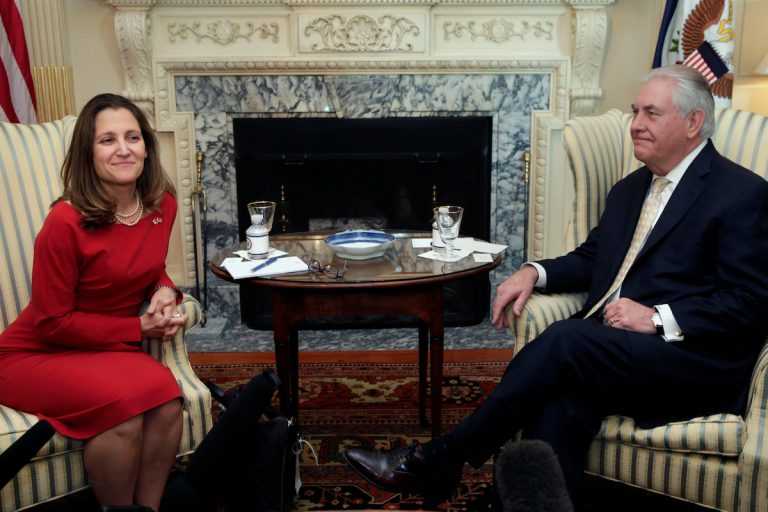WASHINGTON – Canada opposes the idea of the United States imposing new border tariffs and would respond to any such move, the country’s foreign minister, Chrystia Freeland, said on Wednesday after her first meeting with U.S. Secretary of State Rex Tillerson.
Tillerson’s meeting with Freeland, and a separate meeting with Mexican Foreign Minister Luis Videgaray, at the State Department touched on the trilateral North American Free Trade Agreement, which President Donald Trump wants to renegotiate.
Speaking to reporters afterwards, Freeland said she made clear in the meeting with Tillerson that Canada would oppose the idea of border tariffs on Canadian goods in upcoming NAFTA talks.
“If such an idea were ever to come into being, Canada would respond appropriately,” she told reporters on a conference call, stressing that Ottawa did not yet know what the U.S. opening position would be.
Both Canada and Mexico send the bulk of their exports to the United States and could be crippled by major changes to the North American Free Trade Agreement, which Trump has called “a disaster.”
Mexico, in a statement ahead of Videgaray’s meeting with Tillerson and U.S. Secretary of Homeland Security John Kelly on Wednesday, said that Videgaray would address issues including the protection of Mexicans in the United States and migration, as well as security and border infrastructure.
After their hour-long meeting, Videgaray told reporters that Tillerson had said he would visit Mexico in the coming weeks, according to a Mexican Foreign Ministry official.
The State Department did not provide a readout of either of the meetings, which occurred in Tillerson’s first full week in his new post.
Trump made free trade deals a major target during his campaign for the presidency. He says NAFTA, formally signed in 1994, has harmed American workers.
The pact was aimed at removing tariff barriers between Canada, Mexico and the United States.
Canada is trying to persuade the new administration and senior politicians that its especially close ties with the United States mean the country should be spared protectionist measures.
“In making the case for how balanced and mutually beneficial our economic relationship was, I really felt I was pushing on an open door with everyone I spoke to,” Freeland said.
YEGANEH TORBATI
LESLEY WROUGHTON










